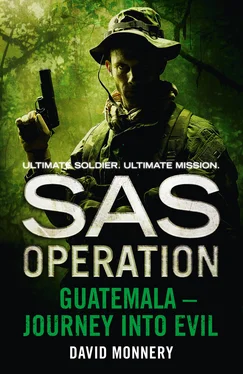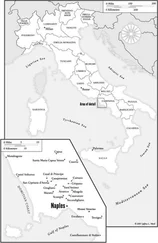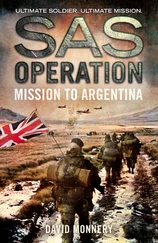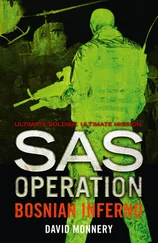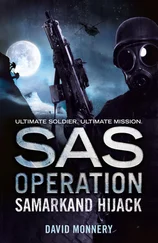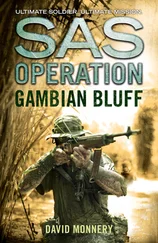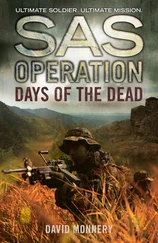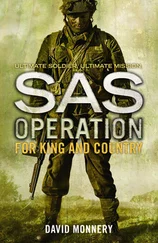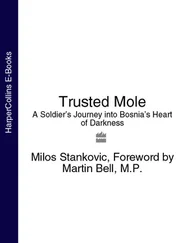He had been a good soldier – he was certain of that – but being a soldier, and an SAS soldier at that, had always been a means to an end for him, not an end in itself. It had given him the scope to stretch himself, and to see the wild parts of the world in a way which the tourist or even the seasoned traveller never could. There was no adventure-holiday company yet which offered a week-long hike out of Colombia, across mountains and through jungle, with the forces of a drug cartel and the national army on your tail.
But after Bosnia things hadn’t been the same. Maybe it had been the mission itself, or maybe he had just outgrown one way of looking at himself and the world. Damien Robson had died there, making Joss Wynwood and himself the only remaining survivors of the Colombian mission. That was chilling enough, but not the main reason for his change of heart. In Bosnia he and Razor – both of whom had chosen medicine as their first SAS specialization – had spent as much time looking after people as they had fighting. There had been the women from the Serb brothel, the children injured in the shelling of Zavik. He and Docherty had been round Sarajevo’s City Hospital, and witnessed the incredible dedication of people working in near-impossible conditions.
Back in England he had decided that there were other ways to travel and to serve than with the SAS. He had been quite happy to serve out the remainder of his three-year term. The work was rarely boring and there were always new opportunities to learn. Some of these – like the helicopter pilot’s course he had recently begun – would provide him with skills that were bound to be useful in the sort of Third World situations where he expected to find his civilian future.
What he had not anticipated was that anyone would ask him to take up arms again, much less send him out on loan to an army notorious for its murderous cruelty.
The MI5 report was waiting on Martin Clarke’s desk when he arrived back that evening from a day-trip to Brussels. Placing the miniature hamper of Belgian chocolates to one side – he had forgotten Valentine’s Day the previous year, and decided to shop in advance this time – he took the file across to the armchair by the window and started to read.
Darren James Wilkinson was born on 6 February 1958, which made him almost thirty-seven. And, as Clarke’s wife Sarah would have told him, an Aquarius. He had been raised in Islington and Walthamstow by his hospital nurse mother, and attended the local comprehensives. The name Highbury Grove rang a bell. Wasn’t that the school Rhodes Boyson had been headmaster of? God help the pupils, Clarke thought.
Wilkinson had clearly shown no aptitude for study. He had left school in the summer of 1974, and spent the next eighteen months moving from job to job. He had been out of the country several times during that period, mostly as a travelling football supporter, but there had also been two three-month stints as a barman in Marbella. He had joined the Army soon after his eighteenth birthday. After four years’ service with the Welsh Guards he had applied to join the SAS, and satisfied all the entrance requirements with flying colours.
No doubt his experiences as a football hooligan had come in handy, Clarke thought sourly.
But he had to admit that the man had an excellent service record. His first important job had been the one in Guatemala, and though he had obviously played a subordinate role, he had been commended for his performance. Two years later there had been the business in Argentina, which Clarke already knew about. The only new information in this regard concerned Wilkinson’s subsequent arrest, along with fellow-trooper Stewart Nevis, on a charge of being drunk and disorderly in the Chilean town of Puerto Natales. The two men had apparently defaced a local statue and given the locals an impromptu concert at two in the morning.
‘Once a football hooligan, always a football hooligan,’ Clarke murmured to himself.
Still, Wilkinson had been promoted to corporal almost immediately, and raised to the rank of sergeant five years later, when he joined the staff of the Regiment’s Training Wing. From then until the Bosnia mission early in 1993 he had hardly been out of the UK.
Clarke had never been privy to the details of the affair in Bosnia, and after reading the report’s account he could see why his superiors had not been eager to publicize the matter. The SAS team had been sent in to investigate rumours that one of their own colleagues was running a private war in the Bosnian mountains, and if necessary to extract him by force. Instead of doing so, they had rescued about fifty women from a Serb prison, done everything but assist their renegade colleague in his private war, and then ignored direct orders to bring the man out, escorting a truckload of wounded children to safety instead.
The report attributed this wilful insubordination to the team commander, the now-retired Sergeant James Docherty, but as far as Clarke could see no action had been taken against either him or any of the others. The SAS had simply closed ranks around the matter, as if the Regiment was a law unto itself. Which it probably was, Clarke thought. He was still smarting from the way its Commanding Officer had addressed him a few days earlier.
What had Wilkinson’s contribution to the affair been? Clarke wondered. Had he argued with Docherty, simply followed orders, or even encouraged him? There was no way of knowing. But it was Wilkinson who had married the Bosnian woman that the SAS team brought out with them; Wilkinson who had called the MoD official at RAF Brize Norton ‘a prick’.
Clarke sighed and stared out at the London night. There didn’t seem much doubt that the man was prone to insubordination. But at least he hadn’t been in any trouble since the Bosnian business. According to the report he had suffered from persistent nightmares for a while, but a few visits to the Regiment’s ‘psychiatric counsellor’ had apparently put him back together again. Anyway, he was the one the Guatemalans wanted. They could damn well keep him in order.
Ten minutes later Clarke began telling his contact in the US State Department that there were few finer examples of British soldiering at its brilliant best than Sergeant Darren Wilkinson of 22 SAS.
A solitary bird suddenly began to sing, and after what seemed only a momentary pause, another thousand joined in. Emelia Xicay lay flat on her stomach in the tall grass above the road and listened. For a few minutes the nerves which always preceded an action were banished, and she smiled with unalloyed pleasure. At times like this she always felt truly blessed – this, just as much as the horrors and the sadnesses, was her birthright as a Mayan Indian. Here in the mist she felt herself enveloped by the damp richness of the earth and trees, carried along by the song of the birds. She belonged in the natural world, the way so few foreigners seemed to do.
At such times she felt almost sorry for the Ladinos, who seemed to have no such sense. But not all of them, she reminded herself sternly. Tomás said some understood life and the earth the same way their own people did. He had Ladino friends, and she would too, once she could speak to them fluently in their own language.
She thought about the city, and wondered if she would ever see it. Tomás had told her about it, of course, and so had Francisco, but she suspected that both brother and lover had censored their accounts, as if they was trying to protect her from all the many evils which befell their people there.
She hadn’t thought about Francisco for several days, she realized. It was almost a year now since his death in the army ambush.
She turned her mind back to the city. She didn’t want to live there, just to see it. The biggest towns she had ever visited were Santa Cruz del Quiche in Guatemala and San Cristobal de las Casas in Mexico. They had lived just outside the latter for a while, and Emelia had sold woven bracelets to the tourists in the town’s main square with several other refugee children. She could remember lifting up her wares to the smoked-glass windows of the big buses, the pale white hands reaching down with money.
Читать дальше
